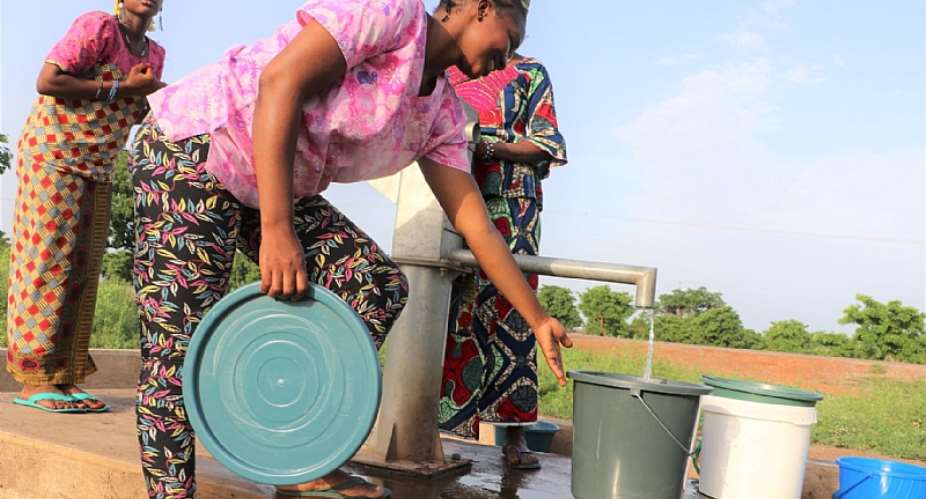The impact of changes in climatic conditions such as temperature and rainfall on natural resources including water resources, and on livelihoods is evident.
In Ghana, many communities are experiencing increasing extreme weather conditions with higher incidences and more prolonged periods of flooding and droughts. It has become necessary to improve clean water accessibility and prioritize water resources management to support livelihoods diversification particularly in rural communities.
In the wake of the COVID-19 pandemic, accessibility to water has become even more critical as water is one of the greatest allies in guaranteeing good hygiene and disinfection.
“When we opened this clinic in 2016, there was no water available at the premises. Clients had to fetch water and bring it to the clinic, especially for emergency delivery. As staff, because we stay here, we were relying on a nearby well for our domestic use and all these were creating inconveniences”, said Alimatu.
Keeping hope alive, Alimatu and her colleagues at the Kukobila Community-based Health Planning and Service (CHPS) Facility, now have easy access to clean water since 2020, thanks to support from a project implemented by the Ministry of Environment, Science, Technology and Innovation (MESTI), in partnership with the United Nations Development Programme (UNDP) and the Adaptation Fund.
Water is one of the most important substances on earth, and every living thing needs water to survive. Effective water resource management is therefore critical to building community resilience to adapt to climate change impacts. Besides its importance for drinking, crop irrigation, and domestic use, water plays an important role in health care delivery, from washing surgical tools and equipment to creating a soothing environment for patients.
“Having this water on our compound is very good. We use it to wash our instruments, mix our suspensions and for other clinical and domestic purposes. It has also made it easy for our clients to wash their hands for the COVID-19 prevention”, Alimatu added.
The provision of the borehole is not only serving the clinic but benefiting community members, whose concern was the over-dependence on limited boreholes. Through the intervention, three boreholes have been provided to complement existing ones in the Kukobila township, increasing access to clean water.
“Instead of using 30minutes to go and fetch water at the nearest borehole in the town, now with just about 1 minute, we can get water for drinking, washing, cleaning, cooking and for our animals”, noted Barichisu Siita, a resident of Kokubila.
In support of Ghana’s implementation of the Sustainable Development Goals (SDGs), the Adaptation Fund project, has provided 145 boreholes for 50 communities including Kokubila, in four regions in Northern Ghana, increasing access to clean water (SDG 6) and building resilience to climate change impacts on water bodies (SDG13). Through the intervention, over 40,000 direct beneficiaries including Alimatu and Barichisu have improved access to clean water.
The project, which has the aim of helping vulnerable communities in Northern Ghana to better manage their water resources and diversify livelihoods, has also rehabilitated 10 dams, with 5 additional dams being completed, improving access to water for irrigation and animal rearing. The project’s alternative livelihood interventions include shea butter and groundnut oil extraction, beekeeping, fish farming, tree seedling nurseries and dry season vegetable production. These are supporting the communities to adapt to the impacts of the changing weather conditions.
Achieving the water-related goals and targets of the SDGs is within reach in Ghana, as the country has made progress with 81% of the population having access to improved drinking water sources. With this progress, one can be hopeful that the remaining gaps can be addressed with the needed partnerships, towards equitable and inclusive development.






 List of 24 ministerial nominees approved by Parliament
List of 24 ministerial nominees approved by Parliament
 You were my inspiration, made me who I am today – Lilian Kumah
You were my inspiration, made me who I am today – Lilian Kumah
 Rainstorm destroys Hohoe E.P. Senior High School building
Rainstorm destroys Hohoe E.P. Senior High School building
 John Kumah strongly supported me to become NPP flagbearer – Bawumia reveals
John Kumah strongly supported me to become NPP flagbearer – Bawumia reveals
 Late John Kumah urged me to run for NPP flagbearer, strongly supported me — Bawu...
Late John Kumah urged me to run for NPP flagbearer, strongly supported me — Bawu...
 Akufo-Addo appoints Joseph Kpemka as Deputy MD of BOST
Akufo-Addo appoints Joseph Kpemka as Deputy MD of BOST
 Ablakwa petitions CHRAJ to investigate sale of SSNIT's hotels to Rock City Hotel
Ablakwa petitions CHRAJ to investigate sale of SSNIT's hotels to Rock City Hotel
 MoF to provide new bailout for defunct Gold Coast Fund investors – Bawumia revea...
MoF to provide new bailout for defunct Gold Coast Fund investors – Bawumia revea...
 OMCs implement price adjustments despite International petroleum price declines
OMCs implement price adjustments despite International petroleum price declines
 Petition to remove Kissi Agyebeng will disrupt operations of OSP – Martin Kpebu
Petition to remove Kissi Agyebeng will disrupt operations of OSP – Martin Kpebu
